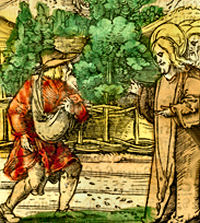» Enjoy our Liturgical Seasons series of e-books!
At the sight of the crowds, Jesus' heart was moved with pity for them because they were troubled and abandoned, like sheep without a shepherd. Then he said to his disciples, "The harvest is abundant but the laborers are few; so ask the master of the harvest to send out laborers for his harvest" (Matt 9:36-38).
Catechism of the Catholic Church, 863:
The whole Church is apostolic, in that she remains, through the successors of St. Peter and the other apostles, in communion of faith and life with her origin and in that she is "sent out" into the whole world. All members of the Church share in this mission, though in various ways. "The Christian vocation is, of its nature, a vocation to the apostolate as well." Indeed, we call an apostolate "every activity of the Mystical Body" that aims "to spread the Kingdom of Christ over all the earth."
Commentary on the Sunday Mass Readings for the Eleventh Sunday in Ordinary Time, Year A:
The First Reading is taken from the Book of Exodus 19:2-6a. This reading is a preliminary to the Sinai covenant where Israel is dearer to Yahweh than any other nation; Israel is to become a kingdom of priests, a holy nation. They needed to grow in holiness and to become a mission-oriented group rather than remain a self-contained body. Israel was specially chosen and enjoyed God's favor, but that election was not to mean isolation and self-satisfaction. —A Celebrants Guide to the New Sacramentary—A Cycle by Kevin W. Irwin
The Second Reading is from the Letter of St. Paul to the Romans 5:6-11. In this reading St. Paul argues from the fact that if God was so good to us as to let his Son die for us while we were yet sinners, we can have the greatest confidence that he will also bring us to heaven (provided we keep our part of the contract) when our earthly life ends, because as followers of Christ we are now adopted sons. —The Sunday Readings by Fr. Kevin O'Sullivan, O.F.M.
The Gospel is from St. Matthew 9:36, 10:8. "Jesus had compassion for them." Who were the "crowds" on whom he had compassion? Among them were tax-collectors who cheated, robbers who robbed, murderers who murdered, harlots who lived lives of unchastity, adulterers who violated their marriage vows, nominal believers in God who never went to the temple or honored God in private. These may have been a minority, but there was no town or district in Palestine of that time in which some, or all such sinners, could not be found. Yet Jesus, who read their innermost minds, had pity on them for he saw that most, if not all of these sinners, acted through ignorance and through lack of instruction. They were lost sheep because they had no shepherd to lead them. The exalted opinion of their own sanctity that their official teachers had, caused them to shun the people, lest they be contaminated.
Christ said the harvest of such poor, misguided souls was plentiful and he needed more harvesters. That, indeed, was true in his day, but it is a hundred percent truer today. Any of our modern larger cities today has a population greater than the whole of Palestine in Christ's day. And the percentage of sinners in these cities would be greater, not less, than the percentage of sinners then in Palestine.
Christ too is unchanged. He still has compassion for today's sinners and wants them to be saved, not lost. But for this he needs "harvesters," apostles, who will help him. Here is where all good Christians, all who really love God and their neighbor, must help. He is not asking us to give up our present occupation, or to leave home and family to become priests or missionaries. The work we can do and which he is asking us to do is on our very doorsteps. In some cases it is inside—in our own homes.
The first movement towards this apostolate to our fellow men is to show the good example of a truly Christian life. In the home and in our place of employment, example may go unnoticed or sometimes even be ridiculed by the very ones who need it, but with the grace of God, which always accompanies it, it will eventually produce good fruit. There are thousands of men and women in heaven today who owe their salvation, under God, to the good example of a sincere Christian neighbor. After good example, comes good advice. A suggestion, a hint, an encouragement, kindly and charitably offered, may often turn a neighbor from evil ways. This good advice must always be humbly and charitably given. Nobody, a sinner least of all, wants to be lectured or "preached at." St. Francis de Sales, the gentlest of apostles, said that one will catch more flies with a spoonful of honey than with a barrel of vinegar. There are pious Christians who abhor sin so much that they abhor and repel the sinner, as well. In this, they are more pharisaical than Christlike. He abhorred sin, but he still loved the sinner and wanted him saved.
The harvest is plentiful; indeed it is huge. But let not its huge size frighten us. If everyone reaps his own corner, we shall all meet in the center of the harvest-field some day.
—Excerpted from The Sunday Readings, Year A by Fr. Kevin O'Sullivan, O.F.M.






